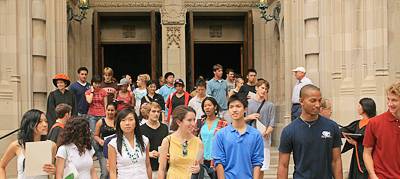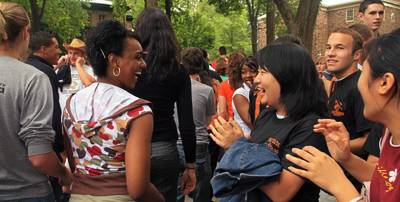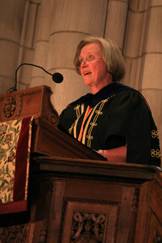Before classes even began, Princeton President Shirley M. Tilghman gave the University's newest students some "homework."
In her address
at Opening Exercises on Sept. 10, Tilghman presented a syllabus of
sorts for the class of 2010, featuring the five keys to a successful
undergraduate experience.
"Pursue your passions, venture where
you have never ventured before, pace yourself, serve others and have
lots of fun," she said. "If you can do all this -- and I am confident
you can -- your lives will be forever shaped by the experiences you
will have and share over these next four years."
The new
students and their families, as well as returning students and faculty
and staff filled the University Chapel for the interfaith service that
traditionally marks the start of each academic year. Classes begin on
Thursday, Sept. 14.
People flying colorful kites on long poles and a band of African
drummers led the procession of faculty members and administrators in
their academic regalia into the chapel. As part of the event,
undergraduate students were recognized for their academic achievements during the previous year.
Tilghman began the ceremony by welcoming not only the freshmen, but new graduate students, faculty and staff as well.
"Walking
down the aisle of the chapel this afternoon, looking into your faces, I
am struck by the enormous potential that resides in each and every one
of you, and by what a tremendous opportunity you now have, in this
truly privileged place, to realize your dreams and to soar," she said.
"I look forward to watching you fulfill those dreams, making Princeton
and, in time, our world a better place for all."
Focusing on the new undergraduates during her address, Tilghman first offered a bit of reassurance.
"Once
you find your academic sea legs, you will do much more than survive --
you will thrive, exploring new fields of knowledge, delighting us all
with your artistic and athletic prowess, challenging us with your
original world view, forming lifelong friendships and finding ways to
be of service to others," she said. "In time, the butterflies you feel
today will be just a distant memory, and your confidence in your
abilities will match the faith that we have placed in each and every
one of you."

She then launched into her five-point plan for success at Princeton.
Tilghman told the freshmen that this stage in their life provides the perfect opportunity to follow their passions. "This is not the time in your life to play it safe or to rest on your laurels," she said. "This is a time to be adventurous and to be honest with yourself about what really gives meaning to your life."
She acknowledged that, for some students, these pursuits will not determine career choices. "Being true to your passions now may take you in directions that have little to do with the career you will ultimately follow, but I want to assure you that this is not a problem," Tilghman said.
Quoting Woodrow Wilson, Princeton's 13th president, Tilghman reminded the students that a liberal arts education is intended to emphasize "not so much learning itself as the spirit of learning."
Then she reminded the parents to keep this in mind when they learn that their son or daughter is pursuing a passion in choosing a particular class. "I can hear them now: 'A course on "Women and Film"? How is that going to pay the bills? Will that get you a job?' Such questions, although perfectly understandable, should not be allowed to drive your intellectual agenda here," she told the students.
Tilghman, who served on Princeton's faculty for 15 years before becoming president, cited the experiences of two of her former students from the class of 1999: a molecular biology major who is now a divinity student; and a classics major who is now a physician.
"Past is not prelude," she said, "and now is the time to do what you are compelled by your intellectual curiosity to do. The future, with Princeton degree firmly in hand, will take care of itself, and your life will be richer for it."
Offering her second piece of advice, Tilghman exhorted the students to explore uncharted territory.
"Important though it is to follow your longstanding passions, you should also take this opportunity to embrace the unfamiliar, to leave your comfort zone, and study subjects or participate in extracurricular activities that are all but unknown to you right now," she said.
She suggested delving into Princeton's wide-ranging curriculum and seeking out students and professors with differing viewpoints. "Diversity of every variety is so much more than a fashionable catchphrase -- it is essential to your intellectual and personal growth and is fundamental to a Princeton education," Tilghman said.

At the same time, she cautioned the students to pace themselves.
"You need to make wise choices about how to spend your time, which
sometimes means sacrificing one thing in order to do something else
well instead of superficially," she said. "What I am trying to say --
and here I may actually win some points with your parents -- is that
you need to keep your eye on both the forest and the trees, but alas
not all the trees, or at least not all the trees at the same time."
Her
fourth key to success concerned the responsibility that comes with a
Princeton degree. She encouraged the students to be more than
"consumers" of education -- to be "users" of education by going out
into the world and making a difference. She pointed to the examples set
by several alumni, including Wendy Kopp '89, whose senior thesis was
the genesis for Teach for America, a nonprofit organization that places
college graduates in teaching jobs in impoverished schools across the
country.
"Their contributions, and those of thousands like them,
justify the investment we -- and you -- are about to make in your
education," Tilghman said. "In return, we ask that you begin by asking today
-- as you begin your lifelong Princeton journey -- how you can embody
our informal motto, 'Princeton in the nation's service and in the
service of all nations.'"
Finally, she told the students to be
sure to have fun. "You won't have either the time or the freedom to
explore yourself and the world in quite this way ever again, so please
enjoy these years as fully as you can," she said.
"Yes, there is
plenty of work to do while you are here, but this is a place to live as
well as to work, and a place to learn how to live life to the fullest,"
Tilghman added. "Princeton is serious, but it is not somber; it is a
place that values beauty and freshness and light and the renewal that
comes from times of reflection and times of joy. So I hope you will
embark on the next four years with a light heart and in high spirits."
"Now you have your homework for the next four years," she concluded. "Good luck to you all -- I'll be watching!"







